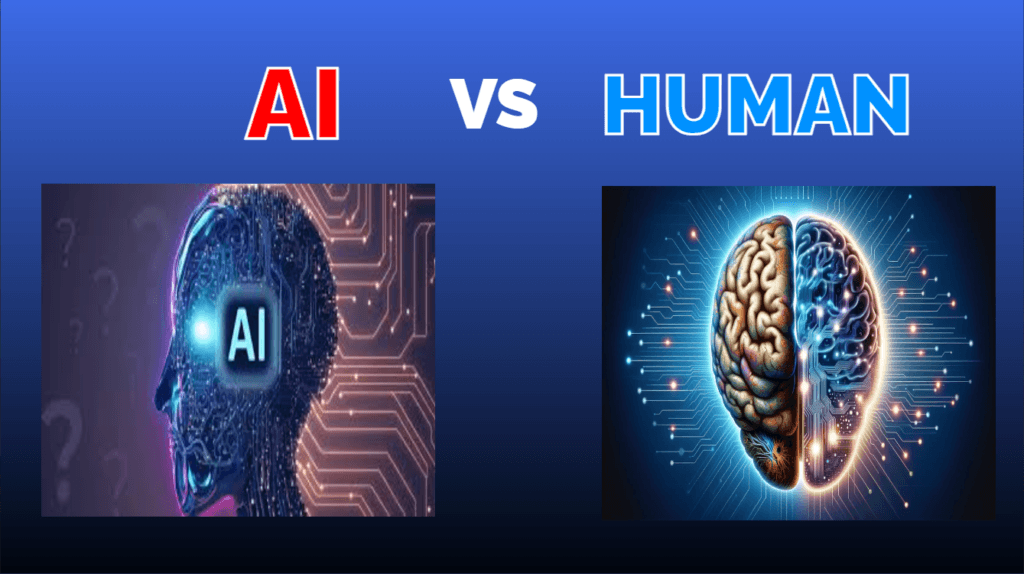Introduction
As artificial intelligence (AI) rapidly advances, the debate about AI vs human capabilities becomes increasingly relevant. The concept is no longer limited to science fiction; AI is now part of our daily lives, impacting industries, enhancing productivity, and revolutionizing the way we approach problem-solving. But can AI truly compete with the human mind? This article explores the differences, strengths, weaknesses, and implications of AI compared to human intelligence.

Contents
What is Artificial Intelligence?
Artificial Intelligence is the simulation of human intelligence in machines that are designed to perform tasks that typically require human intelligence. This includes functions like reasoning, learning, problem-solving, and decision-making. AI systems are powered by machine learning algorithms that allow them to process large amounts of data, recognize patterns, and make predictions.
Key Differences Between AI and Human Intelligence
| Aspect | AI | Human |
|---|---|---|
| Learning Ability | Learns through data and algorithms | Learns through experience and adaptation |
| Problem Solving | Depends on data and programmed logic | Can think creatively and intuitively |
| Emotions | No emotional understanding | Emotional awareness and empathy |
| Speed | Processes tasks faster and more accurately | Limited by physical and cognitive abilities |
| Creativity | Limited by programming and data | Capable of imaginative and original thinking |
Pros of AI
- Efficiency and Speed
AI can process vast amounts of data quickly, making it ideal for tasks that require data crunching, like medical diagnoses, financial transactions, and customer service inquiries. With AI, repetitive tasks can be completed faster, allowing humans to focus on more complex responsibilities. - Consistency and Precision
AI systems, when properly programmed, are highly consistent and precise. They lack the emotional and physical fluctuations that humans experience, meaning they can maintain a consistent quality of work. For instance, in manufacturing, AI machines reduce human error and enhance product accuracy. - 24/7 Availability
AI systems can operate continuously without the need for rest or breaks. This makes them ideal for industries that require constant availability, such as customer service, data monitoring, and emergency services. - Data Analysis and Predictive Power
AI’s ability to analyze and interpret large datasets allows for effective decision-making and predictions. This capability is valuable in industries like healthcare, finance, and marketing, where data-driven insights can significantly impact outcomes.
Cons of AI
- Lack of Creativity and Emotion
While AI can simulate human behavior, it cannot replicate creativity, intuition, or emotion. These are unique qualities of human intelligence that are essential in fields like art, psychology, and management. AI cannot empathize, which limits its effectiveness in roles that require emotional engagement. - Job Displacement
The adoption of AI in various industries raises concerns about job displacement. While AI can handle repetitive tasks, its rise means fewer jobs for humans in those roles, which can increase unemployment in certain sectors, especially low-skill jobs. - Dependence on Data
AI relies heavily on data for training and accuracy. Without quality data, AI algorithms can make incorrect predictions, leading to poor decision-making. This dependence can also make AI systems biased if the data used for training is biased. - High Development Cost
Implementing and maintaining AI systems can be expensive, requiring resources for software development, hardware, and ongoing updates. This high cost may make it challenging for small and medium-sized businesses to adopt AI solutions.
Pros of Human Intelligence
- Creativity and Innovation
Humans possess an unparalleled ability to think creatively and generate new ideas. This quality is especially beneficial in fields like art, writing, research, and entrepreneurship, where innovation is essential. - Emotional Intelligence
Humans can understand, interpret, and respond to emotions. Emotional intelligence is critical in roles involving teamwork, leadership, and customer service, where empathy and understanding improve relationships and outcomes. - Adaptability
Humans can adapt to new situations and environments quickly. This adaptability makes us more versatile in responding to unexpected changes or emergencies, something AI struggles to handle. - Ethical and Moral Judgments
Humans are capable of making decisions based on ethical considerations and moral judgments. This is crucial in fields like law, healthcare, and counseling, where decisions must consider societal norms and ethical implications.
Cons of Human Intelligence
- Limited Data Processing
Unlike AI, humans cannot process large amounts of data at once. Our brains are designed for focused problem-solving, which limits our ability to handle complex, data-driven tasks without assistance. - Inconsistent Performance
Human performance is subject to fluctuations due to factors like fatigue, stress, and emotional state. This can lead to inconsistency in work quality and productivity. - Susceptibility to Bias
Human decisions can be influenced by personal biases and social conditioning, which may lead to subjective or unfair judgments. AI, on the other hand, can be programmed to make unbiased decisions, provided it is trained on fair data. - Limited Availability
Unlike AI, humans require rest, sleep, and time to recharge. This limits our availability, especially in high-demand industries where 24/7 service is required.
AI vs Human: Finding the Right Balance
As we consider the differences, pros, and cons of AI and human intelligence, it’s clear that both have unique strengths and limitations. The optimal approach for the future may involve a collaborative model where humans and AI work together, each contributing their unique strengths.
Conclusion
AI and human intelligence both play vital roles in today’s world. While AI excels in efficiency, speed, and data analysis, human intelligence brings creativity, emotional understanding, and ethical judgment. Rather than viewing AI as a replacement for humans, it’s more beneficial to see it as a powerful tool that can enhance human capabilities. By combining the strengths of AI with human intelligence, we can create a future that leverages the best of both worlds, advancing technology while upholding the irreplaceable qualities that make us human.
